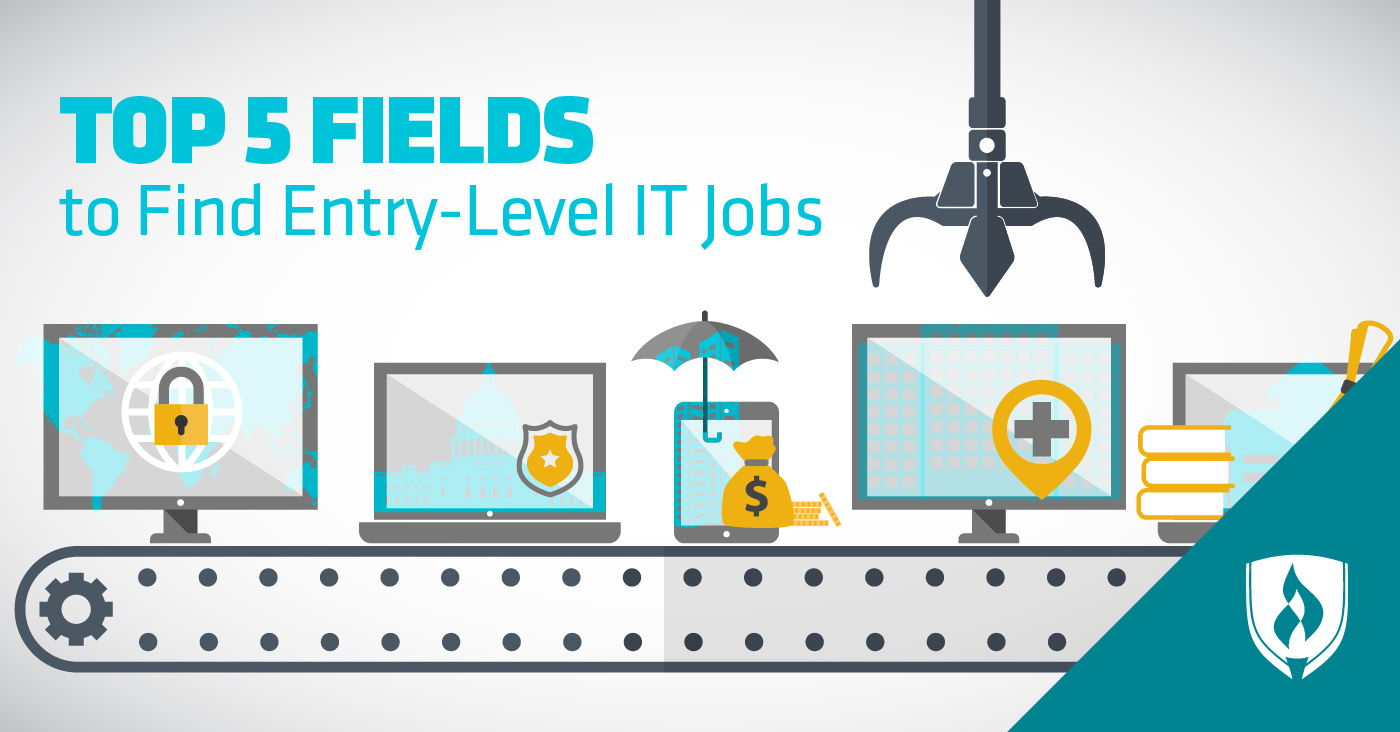
When considering a new career, you’re bound to be a bit apprehensive. Will your time spent in school pay off? Can you combine multiple interests and passions into a worthwhile career you’ll enjoy? You may be hesitant to invest your time and money into education when there’s no guarantee a job will be waiting for you after graduation.
However, if you’re interested in working in technology, you’re in luck. The industry is currently one of the most optimistic industries for job-seekers, according to the Bureau of Labor Statistics (BLS). Employment in computer and information technology (IT) jobs is expected to grow 13 percent through 2026, which is faster than the average rate of 7 percent.
So whether you have some experience and training, or none at all, there may be a career in IT out there for you. We used real-time job analysis software to examine more than 30,000 entry-level IT job postings from the past year.* The data helped us identify the top five industries offering entry-level IT positions. We also found some of the most popular positions for each industry.
Once you’ve equipped yourself with the proper information, skills and education, the opportunities are abundant.
Jobs in IT are everywhere
One of the perks of working in IT is that you are not confined to one industry. From schools and hospitals to retail and the government, nearly every industry today utilizes technology in some way, shape or form. This means you’ll have the flexibility to find jobs in IT nearly anywhere in the United States.
An IT career can also provide you a unique opportunity to concentrate on a field that interests you. By conducting some quick research beforehand, you can narrow your focus and begin building a network within your industry of choice.
Keep reading to learn more about what entry-level IT jobs you might find in each industry.
5 Fields offering entry-level IT jobs
1. Management, scientific and technical consulting services
Employees in this field work for organizations that provide specialized services for their clients. These are activities that require a high degree of expertise and training such as legal services, scientific and technical consulting or engineering and architectural services.
While all organizations in this field aren’t necessarily technology companies, they all incorporate technical aspects in one way or another, which requires IT personnel to oversee the operations. Some examples of top employers of IT professionals in this field are IBM and Accenture.
Most common entry-level job titles:
Education requirements: Eighty-one percent of employers are seeking candidates with a Bachelor’s degree.*
2. Insurance carriers
Employees in this field work for companies that provide insurance policies. This includes the underwriting of insurance policies and selling insurance and other employee-related benefits packages.
These companies use computer networks to store confidential information and records. Because of this reliance on technology, IT professionals are needed to help ensure system security and troubleshoot any issues. Some examples of top insurance companies with entry-level IT job openings are United Health Group and Anthem Blue Cross.
Most common entry-level job titles:
Education requirements:Sixty-four percent of employers are seeking candidates with a Bachelor’s degree.*
3. Hospitals
Establishments within this field provide medical, diagnostic and treatment services for both inpatients and outpatients. Most services can only be provided using specialized facilities and equipment. Some examples of top hospitals employing IT professionals are the Mayo Clinic and UNC Health Care.
IT professionals in hospitals support the technical equipment. Nearly every hospital has integrated an electronic system for medical records, resulting in many entry-level IT jobs to help manage and maintain these highly confidential databases.
Most common entry-level job titles:
Education requirements:Fifty-four percent of employers are seeking candidates with a Bachelor’s degree.*
4. Colleges, universities and professional schools
This industry category covers the establishments that provide instruction or training in a vast assortment of subjects. These may be publicly or privately owned institutions that operate for profit or not for profit. This includes schools, colleges, universities and training centers.
With technology integration into the classroom through the use of tablets, SMART boards and online course platforms, IT professionals are necessary to support, troubleshoot and forecast future needs. These days, it’s safe to say that every educational institution employs an IT department.
Most common entry-level job titles:
Education requirements:Seventy percent of employers are seeking candidates with a Bachelor’s degree.*
5. Software publishing
Companies in this field produce and distribute computer software for individuals or companies. Virtually every organization today utilizes some sort of software to operate their business more efficiently. Software publishing companies handle everything from designing, installing and providing support to customers.
The software publishing industry is made up of two categories: applications software and systems software. Applications software refers to individual programs for computer users, while systems software is made up of entire operating systems and all related programs that allow computers to function. Some examples of companies in this field hiring entry-level IT professionals are Oracle and Microsoft Corporation.
Most common entry-level job titles:
Education requirements: Ninety percent of employers are seeking candidates with a Bachelor’s degree.*
Qualify for entry-level IT jobs
As you can see, IT professionals can work in almost any industry that interests them. Now that we’ve shown you a brief breakdown of the top industries for entry-level IT jobs, the choice is yours. If you like the idea of pursuing a career that can provide you with excellent industry flexibility, jobs in IT are definitely worth considering.
But there’s still plenty to learn about working in information technology. To get the inside scoop on how to break into the IT field, check out our article, “6 Ways to Gain the IT Experience Employers Are Looking For.”
RELATED ARTICLES:
- What Can You Do with an Information Technology Management Degree?
- 8 Things You Should Know Before Working the IT Help Desk
- Should I Be an IT Major? The Info You Need to Know to Decide
- 5 Hands-On IT Jobs That Won't Break Your Back
- 5 Reasons You Don't Need to Be 'Tech-Savvy' to Pursue a Technology Career
- What Is a Desktop Support Technician? Exploring This Key IT Career
*Burning-Glass.com (Analysis of 31,682 entry-level IT jobs by industry, February 01, 2016–March 31, 2017).
EDITOR’S NOTE: This article was originally published in October 2013. It has recently been updated to include information relevant to 2017.




